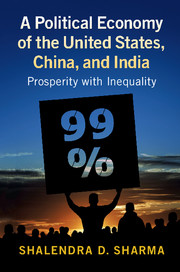
- Publisher:
- Cambridge University Press
- Online publication date:
- May 2018
- Print publication year:
- 2018
- Online ISBN:
- 9781316871997
Our systems are now restored following recent technical disruption, and we’re working hard to catch up on publishing. We apologise for the inconvenience caused. Find out more: https://www.cambridge.org/universitypress/about-us/news-and-blogs/cambridge-university-press-publishing-update-following-technical-disruption

The precipitous rise in global and national economic inequality, which the inexorable force of globalization promised to address with affluence and abundance for all, has returned with a vengeance. The problem of worsening socioeconomic inequality and how best to ameliorate this pernicious resurgence occupies center stage of national and international politics. This study investigates the coexistence of high rates of economic growth and unparalleled prosperity (including a review of the decline in poverty levels in China and India and many other developing countries) with rises in income and wealth inequality in the United States, China, and India. This book examines the overall effectiveness of the measures taken by these three countries to address such anomalies, and what they should do to tackle the problem of widening inequality. This study breaks new ground by providing an original comparative analysis of the challenges facing the world's three major economies.
'This is the first comparative study of the drivers of inequality in three countries with radically different political and economic institutions. Shalendra D. Sharma shows how the interaction between globalization, institutional arrangements and public policy can increase income inequality in different political and economic contexts. His original insights and sobering findings should make this book required reading for all concerned with the causes and consequences of inequality in the new gilded age.'
Minxin Pei - Claremont McKenna College, California and author of China’s Crony Capitalism
'Professor Sharma tackles head-on one of the toughest political economy questions of the twenty-first century: how to deal with inequality, and what can the experience of the US, China and India tell us so far? His survey of the literature and analyses of the issues are insightful and revealing. No country has so far dealt satisfactorily with the issue of growing social income and wealth disparities and the fact that different regimes are trying different solutions may suggest that the issue is not theoretical but totally outcome oriented. I commend Professor Sharma's book as essential reading for both professionals and laymen interested in how to deal with the political problem today - at least in terms of its overall effectiveness when it comes to reconciling economic growth with more equitable distribution.'
Andrew Sheng - Distinguished Fellow at Fung Global Institute, and author of From Asian to Global Financial Crisis
 Loading metrics...
Loading metrics...
* Views captured on Cambridge Core between #date#. This data will be updated every 24 hours.
Usage data cannot currently be displayed.